André Klein's Blog, page 25
November 6, 2012
The Beauty Of Paperless Publishing
 Everyone talks about how ebooks are great because they cost less, ship faster and don’t kill trees. And it’s all true, but even before a book hits the (virtual) shelves, the production process has changed significantly.
Everyone talks about how ebooks are great because they cost less, ship faster and don’t kill trees. And it’s all true, but even before a book hits the (virtual) shelves, the production process has changed significantly.
10 years ago when I had finished a first draft of a story hacking away at my keyboard, I wiped the sweat off my brow and clicked on “print”. Depending on the length of the story, a few minutes or hours later due to paperjams, I pawed the precious pages filled with words and paragraphs excruciatingly scraped from the insides of my skull.
At first there was an impression of immaculate order, the black letters standing out crisply against their white background. But even while still pulling the sheets out of the printer and sorting them (because yet again I had forgotten to click the “reverse” button in the print menu) I started to notice typos, broken metaphors and busted syntax.
Armed with pencil I started reading through the first draft, fueled by the drive to squash even the smallest mistakes in the first run. Naturally, I missed most of them, and I had to return later, with different colored pens. The margins quickly filled with garbled notes, the text itself began to look like a poorly patched up patient with all its cross-outs, corrections and counter-corrections.
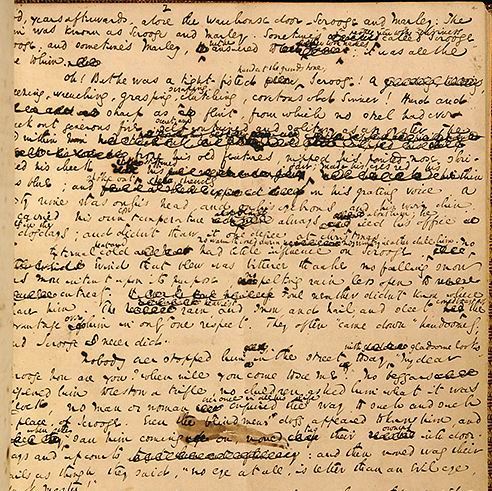
Charles Dicken’s manuscript of A Christmas Carol (via NY times)
And this process continued for many weeks, each time inserting the revisions, printing it all out again, revising and editing, running out to get more printer ink, printing, and so on and so forth. Through the years I must have killed a minor forest like this.
Enter the Paperless AgeSince the beginning of this year I have begun to shift away from this style of working, mostly because my printer had finally joined the choir invisible and I was tired of producing revisions that became impossible to decipher after a few hours of work.
Nowadays, whenever I finish a first draft I load it onto a tablet or ereading device and start tapping, selecting and typing my notes. Among the advantages are
speed: instead of waiting for my printer, I click once and can start workingcost: no more paying for paper and inkform: even if I work a lot on a draft, it still stays legiblemobility: the Kindle app syncs all notes across multiple devices, so I can continue editing on the moveguilt-free: I don’t feel I have to limit my revision runs anymore. More drafts don’t mean more dead trees.
editing through the Kindle app
I have to admit, sometimes I miss the mess of sitting within an ocean of unstapled sheets, scrawling multicoloredly all over them in the manner of a madman, but ultimately the digital process is not just more convenient but also makes a lot more sense.
What do you think?
-
thumbnail: Some rights reserved by dcysurfer / Dave Young

 About the author:
André Klein was born in Germany, has grown up and lived in many different places including Thailand, Sweden and Israel. He has produced two music albums, performed and organized literary readings, curated an experimental television program and is the author of various short stories and non-fiction works.
About the author:
André Klein was born in Germany, has grown up and lived in many different places including Thailand, Sweden and Israel. He has produced two music albums, performed and organized literary readings, curated an experimental television program and is the author of various short stories and non-fiction works.
October 31, 2012
The Flipped Office: Work at Home, Relax Outside

The concept of the “flipped classroom” refers to a reversal of traditional teaching, where the lecturing part happens outside of the classroom (i.e. through videos, reading, etc.) and the exercise or interaction part happens inside the classroom.
While the “flipped classroom” is sometimes hyped in the manner of tech-evangelists, I believe that the idea is a valid one when understood as part of a broader trend. More precisely, it may not be limited to education at all but might illustrate general technology-induced changes in everyday living.
Work Outside, Relax at HomeA few years ago I was working as a teacher and spent at least 3 hours every day commuting. Fed up with hunting after buses and waiting for delayed trains in the snow I began thinking about a way out. Even the most respected, best-paid jobs would require at least a minimum amount of daily commuting and I just couldn’t imagine myself wasting away the next few decades in the commuting cycle. So I started shifting my teaching job to the Internet (as documented here) which allowed me to work from home or anywhere with an internet connection for that matter.
Slowly but surely things began to change. First of all, I gained a lot of time that I used to waste on commuting (which is basically a form of unpaid working time). Secondly, I noticed that I was now spending a lot of time at home, unsurprisingly perhaps, since building an online teaching business from the ground up required many hours of hard work and dedication, even outside the actual lessons.
In other words: my home, formerly a place to “crash” after a hard day’s work, now became my working place. I had gained a lot of free time, but I had lost a space to retreat from my work.
I’m sure many freelancers can relate to the fact that overworking can be a bigger issue when you’re self-employed than when you’re working for someone else and simply drop your tools the moment the bell rings.
On top of it I have to admit that while theoretically I could offer my lessons from any place with an internet connection, most of the time I continued to sit at my familiar desk at home. It might have been related to the fact that it’s very difficult to sit down and concentrate on a live-call in public wifi spots, or simply that the daily habit was becoming too ingrained. I should mention however, that online teaching did enable me to move to a foreign country while taking my job with me, but what I’m talking about here is daily habits, not geographical location.
And thus, while I had gained a lot of free time, became my own boss, moved to a different country and could theoretically work from anywhere on the planet, I felt I was missing out on something. And it took me a while before I noticed the missing link.
Relax Outside, Work at HomeOne thing that always bothered me about teaching (whether offline or online) is that you have to show up at a certain time at a certain place (be it a virtual or a brick and mortar classroom). So I decided to shift my teaching activities to an asynchronous format, which is just a fancy way of saying that I started to write books which students could learn from in my absence. To make a long story short, I eventually arrived at a place where I didn’t have to slice my day into many different lesson slots anymore. And then, something interesting happened.
At first, I was continuing to live the way I had gotten accustomed to while teaching online, which basically meant working every day from my desk with a few holidays here and there.
Nevertheless, my home was still my office. I gained many great freedoms, but I still had “lost” my home as a retreat, so to speak.
Recently, I noticed another change. I found myself travelling a lot more, not just on “holidays” but on a consistent basis, as part of my weekly routine. And it was yesterday, riding a bus through the countryside when I noticed that I had (unconsciously) made a 180 degree turn from my early commuting life. Instead of travelling every day to work and coming home to rest, I was now working every day at home and travelling to rest.
As my wife put it, industrial man lived indoors and exploited the outdoors, while post-geographic humanity may work indoors and find new appreciation and life outdoors.
To make one thing absolutely clear: working from home is awesome, and I don’t regret my decision to quit the commuting life one bit. Nevertheless, I decided to write this article as a way to illustrate also the challenges. Also, I’m curious how other people relate to these challenges. Do you have a strict disciple to keep yourself from working too much? How do you find rest after working many hours from home? How do you balance outdoors and indoors?
-
img: Some rights reserved by fabcom

 About the author:
André Klein was born in Germany, has grown up and lived in many different places including Thailand, Sweden and Israel. He has produced two music albums, performed and organized literary readings, curated an experimental television program and is the author of various short stories and non-fiction works.
About the author:
André Klein was born in Germany, has grown up and lived in many different places including Thailand, Sweden and Israel. He has produced two music albums, performed and organized literary readings, curated an experimental television program and is the author of various short stories and non-fiction works.
October 22, 2012
Paperback vs Ebook: The Best Of Both Worlds
Yesterday, I received the print proof for the second episode of my detective story for German learners “Die Dritte Hand”. And I continue to be amazed by the quality of Amazon’s CreateSpace, a print-on-demand service that lets anyone publish almost anything.
From E-book to P-book
Unlike many traditionally published books, this book (and its predecessor) actually came out as a digital edition first. It was only later that I decided to turn them into print.
Why? Ebooks are a lot more flexible when it comes to financing. Since there are no printing and shipping costs, not only can I offer the books at far more competitive prices, also royalty shares are higher. On top of that, with ebooks there’s no waiting for the book to arrive. You order an ebook and a few seconds later you are reading it. So, why bother with print anyway?
Although the ebook market is still growing at an exhilarating pace, many people all over the world still prefer paperbacks. In Germany for example, only 2% of all sold books are ebooks while in the UK it’s already 12% and the US 25%. Nevertheless, even in the US three quarters of book sales are not ebooks.
And while I prefer reading electronically (since I bought an ereader I haven’t purchased a single paperback), many people simply don’t. So I started experimenting, first with a children’s book, then with episode 1 of my detective series, and now with the third paperback I’m slowly getting the hang of it.
At first, I found the CreateSpace formatting requirements confusing, but when you’ve done it once, it gets a lot easier each time. As for sales, I’m still no millionaire (e-book or p-book-wise) but I’m happy to say that the paperbacks are selling, almost every day, which I really didn’t expect. Here are some pictures of the final product:
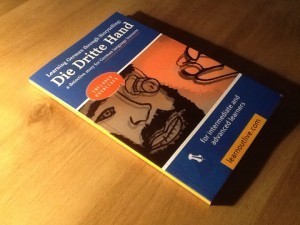
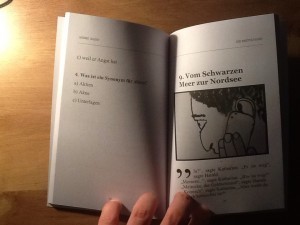
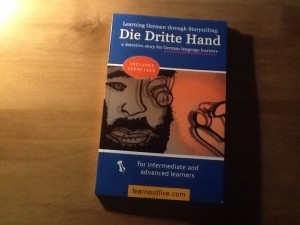
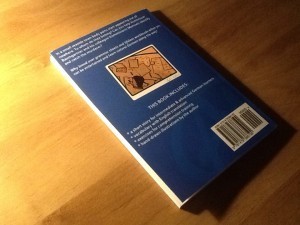
For the technically inclined, here are some numbers:
5.06″ x 7.81″ (12.852 x 19.837 cm)
Black & White on White paper
98 pages
List Price: $8.99
Printing & Distribution: $3.59

 About the author:
André Klein was born in Germany, has grown up and lived in many different places including Thailand, Sweden and Israel. He has produced two music albums, performed and organized literary readings, curated an experimental television program and is the author of various short stories and non-fiction works.
About the author:
André Klein was born in Germany, has grown up and lived in many different places including Thailand, Sweden and Israel. He has produced two music albums, performed and organized literary readings, curated an experimental television program and is the author of various short stories and non-fiction works.
October 12, 2012
Why FREE and PAID Don’t Contradict

We’re living in the 21st century but in many ways we are still looking at life through 20th century glasses. It is this conflict or clash that characterizes most contemporary debates about privacy and copyright.
From Mass Production To “Handcrafted” Digital ArtefactsIn the wake of the Industrial Revolution, humanity became accustomed to the consumption of products in whose production human hands had no (significant) function: from the assembly line straight to our homes.
In the 20th century this principle of a “consumer society” based on mass produced commodities was experiencing its climax, boosting sales with carefully constructed brand images and aggressive advertising campaigns that attacked all the senses.
People were buying music on vinyl, then on tape, and when the CD came out they purchased all their records again in a digital format. This process could have continued indefinitely if there had come one physical storage medium after the other.
Instead, the preferred format suddenly shifted from a physical format to a purely electric one.
As McLuhan wrote in Understanding Media: “Electricity does not centralize, but decentralizes”
Therefore, as soon as the preferred format (mainly a matter of convenience) became purely digital, such as the MP3, various movie file formats and lately the ebook, cultural commodities suddenly have become very difficult to control. This doesn’t mean that people aren’t trying to exert the same centralized power over cultural goods as in pre-digital or pre-electic days, but rather that these means of control are deeply anachronistic and in conflict with the very nature of these formats.
And while some of us are busy fighting natural developments – these quixotic but apparently necessary allergic reactions to everything new – others are trying to reevaluate consumption processes on the basis of a changed playing field. Thanks to the proliferation of digital devices, now everyone can create and distribute digital media themselves. In a similar way that the washing machine has allowed people to do the laundry in their own homes, the computer has allowed us to create movies, books and music from the convenience of our decentralized locations.
Free Vs Paid: a false dichotomyIn a time where cultural goods are largely independent of their physical storage medium, the concept of pricing and selling has to be reevaluated as well. When a musician doesn’t pay a single cent for giving away millions of promotional “copies” of his works, the division between “advertising” and “product” is obliterated. Contrary to the razor and blades model, there’s no “catch” here. Artists or intellectuals can offer their works for free, no strings attached, because through the distribution of these works they gain recognition for other (potentially non-free) works. But even when we’re talking about one and the same product, there’s no reason why “paid & free” is a contradiction.
In my experience this works both simultaneously and asynchronously.
Here are two examples:
1. SIMULTANEOUSLY:
When I found out that one of my books got “stolen” I decided to offer the book as a free download. The result: the book continues to sell, even better than before. In other words: the fact that something is available for free doesn’t prevent it from generating income. It’s the same for having articles freely available and accessible on a blog and at the same time offering paid collections for ereaders etc.
2. ASYNCHRONOUSLY:
This is a more classic but still very interesting approach that I’ve been experimenting with. Whenever a new book comes out I make it free at first, such as my recent short stories (there’s a new one out just now). In this way, whoever stays in touch and reads this blog, etc. will be able to consume almost everything I produce without paying a single penny, whereas I’m still able to continue living (and creating more stuff) off royalties from subsequent sales.
In other words, there’s a lot of work to do in reevaluating these processes, and in a way I’m grateful for draconian anti-piracy lobbies because they create the background on which projects like the Humble Ebook Bundle or my own experiments can gain a new momentum.

 About the author:
André Klein was born in Germany, has grown up and lived in many different places including Thailand, Sweden and Israel. He has produced two music albums, performed and organized literary readings, curated an experimental television program and is the author of various short stories and non-fiction works.
About the author:
André Klein was born in Germany, has grown up and lived in many different places including Thailand, Sweden and Israel. He has produced two music albums, performed and organized literary readings, curated an experimental television program and is the author of various short stories and non-fiction works.
October 9, 2012
Why Handwriting Might Be More Important Than We Think
A few days ago the Guardian published an extract of Philip Hensher’s book “The Missing Ink” which asks the question what role handwriting still has in the age of Twitter and texting.
Sensory ImmediacyIt hit me that we are at a moment when handwriting seems to be about to vanish from our lives altogether…
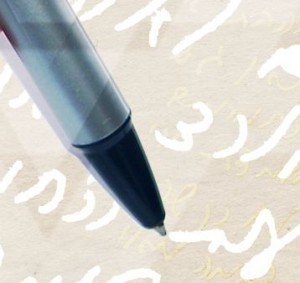
Do you remember the times we used to sit in school, playing with our fountain pens, gnawing on our pencils to remember a certain word or express that idea lingering on the tip of the tongue?
When we compare this way of writing with typing on a keyboard the latter seems almost sterile. Instead of making circular movements with our wrist, shifting our body to give letters and words their unique slants, we are now whacking at keys in a linear fashion. The smooth connecting of loops and angles forming letters has given way to a staccato of disconnected consonants and vowels.
It would be a miracle if this didn’t have any effect on the way we express ourselves.
Individual ExpressionWe have surrendered our handwriting for something more mechanical, less distinctively human, less telling about ourselves and less present in our moments of the highest happiness and the deepest emotion.
I’ve never been subjected to an analysis of my handwriting (except by elementary teachers) but apparently graphology is still a big thing when hiring employees, for the simple reason that it reveals more about our personality and character than anything else.
Handwriting is what registers our individuality, and the mark which our culture has made on us. It has been seen as the unknowing key to our souls and our innermost nature. It has been regarded as a sign of our health as a society, of our intelligence, and as an object of simplicity, grace, fantasy and beauty in its own right.
Can a tweet or status update, no matter how witty, replace this kind of personal mark?
We’re all typing on the same keyboards, the same devices, and I sometimes wonder if the more we try to be different, we just become more similar.
Reclaim Your ScriptAs Hensher says, ”handwriting is good for us. It involves us in a relationship with the written word that is sensuous, immediate and individual.”
Even if it doesn’t serve a function anymore (most official communication doesn’t require handwriting) it might still be a good idea to simply pick up a pen once in a while and write a few words. And as I’m writing this, I wonder why nobody has tried yet to create a Twitter of handwriting. Would people refuse to use it? Are we simply too lazy? Or are we maybe afraid of the clues our writing might reveal about ourselves?
In the last few weeks I was assisting in the production of a book about Hebrew Handwriting, and I was amazed by the simple joy of tracing shapes on paper. In a way the foreign shapes of Cursive Hebrew allowed me to re-experience that magic moment when I first learned to write in my native language. It certainly does put one in a different space, compared to typing.
If you want to find out more about this project, see also Eti’s release note here.

 About the author:
André Klein was born in Germany, has grown up and lived in many different places including Thailand, Sweden and Israel. He has produced two music albums, performed and organized literary readings, curated an experimental television program and is the author of various short stories and non-fiction works.
About the author:
André Klein was born in Germany, has grown up and lived in many different places including Thailand, Sweden and Israel. He has produced two music albums, performed and organized literary readings, curated an experimental television program and is the author of various short stories and non-fiction works.
October 4, 2012
“98 percent of all culture is unavailable”
Yesterday I stumbled over a short video clip summarizing the history of the land commonly known as Israel/Palestine/Canaan. Before the 3 and a half minutes were over I found myself laughing uncontrollably due to the sheer tragic comedy of it all.
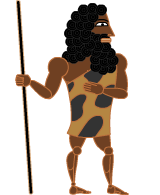 But (although a fascinating topic) the history of the Middle East is not really what I’d like to talk about today.
But (although a fascinating topic) the history of the Middle East is not really what I’d like to talk about today.
Like always when I find noteworthy content on the Net, I follow the breadcrumb trail for more. So I clicked through to the website of the creator, Nina Paley, and found that she’s not only (successfully) using Kickstarter to found a current project, but that she created a feature-length animation film called Sita sings the blues which she gives away for free, no strings attached.
This film is an interesting mashup between the legendary Indian epos of the Ramayana, the creator’s personal breakup drama, and eleven songs of the 20ies American jazz singer Annette Hanshaw.
If you’re wondering how that all fits together, well, it does – in its own colorful way, and you can watch the whole movie in HD on YouTube or download it.
After watching the movie I decided to find out more about it and read through the FAQ on the animator’s homepage.
And here’s the interesting bit: The songs used in the film were supposed to be in the public domain (because copyrights naturally expire after a while) but the compositions underlying the songs were far from being copyright-free. Their copyright was “extended by big media corporations for various reasons”.
To legally use the songs in her film, the director (who’s just a normal individual like you and me, not a corporate identity) was asked to pay an average of $20,000 per song, totaling at $220,000 for all eleven songs, a cost far higher than the production of the whole movie!
In the utterly weird way contemporary copyright laws work, she had to borrow $50,000 dollars to decriminalize the film, just for “making it a bit safer” to give it away freely.
All of this begs the question: Why do media corporations put such hurdles on using songs from the 20ies which aren’t creating huge profits for them anyway?
Paley had an interesting answer to that:
The corporations that hold these copyrights are media companies that also control most of the new media that comes out. Estimates vary, but it’s said that 98 percent of all culture is unavailable right now because of copyrights. So the reason they hold the copyrights isn’t because they want to get paid, it’s because they don’t want all the old stuff competing with the media stream that they control now. If you control Britney Spears, people are only going to listen to Britney Spears if they can’t listen to anything else. That’s why I think the system is still in place. There’s so much old good music that people would be listening to now. But if people listened to it, what would they do with the new stuff? If culture were freer, it would compete with people’s time in consuming new stuff.
Driven to an extreme, this theory sounds like a conspiracy, but I have to admit there’s something to it. Personally, I don’t watch many big Hollywood movies, actually I can’t remember when was the last time I went to the cinema to pay for a blockbuster. One reason for that is that there are simply too many preferable alternatives, whether it’s independently produced movies or classics whose copyright has expired.
I’ve always questioned copyrights, not just regarding other people’s content, but also when it comes to the piracy of my own work, and while it’s obvious that artists and content producers have to be able to earn enough to keep going, draconian copyright laws and lawsuits in the end just tie the hands of their proponents, while more and more people are using digital tools to shift from being content-consumers to content-creators.
-
img: Nina Paley

 About the author:
André Klein was born in Germany, has grown up and lived in many different places including Thailand, Sweden and Israel. He has produced two music albums, performed and organized literary readings, curated an experimental television program and is the author of various short stories and non-fiction works.
About the author:
André Klein was born in Germany, has grown up and lived in many different places including Thailand, Sweden and Israel. He has produced two music albums, performed and organized literary readings, curated an experimental television program and is the author of various short stories and non-fiction works.
October 1, 2012
Nina Hanáková: Learning doesn’t belong to schools with desks and coursebooks
The following interview is part of an interview series in which we feature education professionals from a variety of different fields in order to highlight individual efforts and creative solutions to education in the 21st century. If you want to participate simply write down and send your answers to the five below questions to info {at} learnoutlive.com and include a picture of yourself. (Please note that we reserve the right to not publish all submissions)
video on youtube
1. Who are you and what do you do in education?

I am a freelance English teacher from Brno, the second largest city in the Czech Republic (400.000 inhabitants) and I have been teaching English, with a short break during my maternity leave, for 8 years. I am originally Czech, I am 34, I have one daughter and I love being back in my hometown after many years of living in other countries and travelling/working around Europe. I spent a lot of time mainly in the US/the UK and Holland/Belgium. Apart from my mother tongue – Czech – I can speak English, Dutch and some French.
This is my 9th year of being a freelance ESL teacher and I couldn´t love my job more. I work both locally in Brno and online, via Skype and social media sites. I specialize in coaching others how to learn English without coursebooks, groups locally and individuals online. I believe it is much more effective, and also more fun, to learn a language through socializing, communicating with each other and by doing things we like and do in our own language.
So in my local courses we learn by doing. You can for example learn how to cook an Indian meal or we go to a bar with my American friend, who is a singer, and put together a blues song, we go shopping, watch and discuss movies and Ted talks… When I coach individual students I help them find the ways to stop being shy when speaking and motivate to listen, read and write for fun.
Sometimes I record the lessons, so if you go to my Youtube channel, you´ll see some of the lessons there. I also make grammar videos where I point the camera at myself and explain painful grammar issues and vocabulary in a simple way.
What gives me the greatest joy is building a community of students who feel language learning doesn´t belong to schools with desks and coursebooks. And helping someone realize they can aim high, set their goals and achieve them, that is the most rewarding moment for me.
2. Describe a typical work day in your life!
I start working around 9am and I usually don´t finish before midnight. In between there is quite a lot of role-switching, from online coach to blogger to social media expert to videomaker, to in-class teacher, to event organizer and a mom. Most of the time I coach students online in the mornings and teach local group courses in the afternoons. Now more than ever, I seek some downtime and some social time for myself in my weekly schedule. It´s very important, otherwise I would go crazy.
3. In what way has technology in general and the net in particular changed your work?
It has changed my life completely. I used to work with coursebooks and cds, sometimes dvd-roms. Now everything´s on the internet. It´s so easy and mainly for free. I honestly don´t understand how some people can still be teaching from coursebooks. Hello! The world has changed, I feel like screaming sometimes… The whole world is on Facebook, all the answers to your questions are on Google, everyone´s blogging, making videos, sharing, creating. The past two years have turned education upside down, flipped it  .
.
What an opportunity to help thousands of students and build your PLN (personal learning network) from the comfort of your home! Before my lessons were limited to those who could attend my courses locally, now everyone can learn with me through my videos, my FB page/my blog and I am planning to build a videocourse in the near future where students can learn how to learn.
4. What challenges do you see for education in the future?
This is a question I am afraid to answer for myself. Because I am a bit pessimistic when it comes to my country and I have a child for whom I have to decide which road to také, very soon. And the options are not that great, sadly. In the majority of state and private schools, the child is still not considered a unique person, the teachers are still underpaid and despite the neverending debates on how investing in education should be a priority there is still so little money being put into general education. It feels almost pointless to send my child to a school when I know she´s not going to learn things the way she needs to learn them. Do we end up like the Greeks where everyone pays for the private teachers after school so that their kids could pass the exams?
5. Where can we find you online?
My website: englishbrno.cz/en/
My blog: englishbrno.cz/en/blog/
My public FB profile:facebook.com/Nina.EnglishBrno
My official FB fanpage: facebook.com/EnglishBrnoCZ
My Youtube channel: youtube.com/EnglishBrno
-

 About the author:
André Klein was born in Germany, has grown up and lived in many different places including Thailand, Sweden and Israel. He has produced two music albums, performed and organized literary readings, curated an experimental television program and is the author of various short stories and non-fiction works.
About the author:
André Klein was born in Germany, has grown up and lived in many different places including Thailand, Sweden and Israel. He has produced two music albums, performed and organized literary readings, curated an experimental television program and is the author of various short stories and non-fiction works.
September 26, 2012
Sylvia Guinan: Online teaching should not be just for adults or business people
The following interview is part of an interview series in which we feature education professionals from a variety of different fields in order to highlight individual efforts and creative solutions to education in the 21st century. If you want to participate simply write down and send your answers to the five below questions to info {at} learnoutlive.com and include a picture of yourself. (Please note that we reserve the right to not publish all submissions)
video interview on youtube
1. Who are you and what do you do in education?
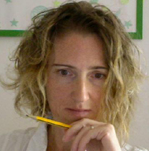 My name is Sylvia. I’m an English teacher who works online. I have a degree in English literature, a teaching diploma and almost twenty years experience in the field. Most of my teaching career has been in Greece but I’ve also worked in schools in Ireland in primary, secondary schools and language schools. I also teach English to my bilingual children in my free time.
My name is Sylvia. I’m an English teacher who works online. I have a degree in English literature, a teaching diploma and almost twenty years experience in the field. Most of my teaching career has been in Greece but I’ve also worked in schools in Ireland in primary, secondary schools and language schools. I also teach English to my bilingual children in my free time.
As an online teacher I teach one –to –one on skype and have larger groups on the teaching platform WizIQ.
I’m also involved in materials development, writing and blogging.
2. Describe a typical work day in your life.
I get up at 7am and prepare my children for school. Then I walk for about 45 minutes along the sea shore for my daily exercise and to mentally prepare for the day ahead. When I get back home, I work online till lunchtime, when my children get back from school. My morning work includes a mixture of teaching, writing, content creation and blogging. I have recently been organizing courses on my learning management system in order to implement more asynchronous teaching programmes and easier tracking of groups.
Most of my lessons tend to occur in the later evening or night time hours.
I set aside three hours a day to teach my children, from about four to seven. This is our quality time when we have lessons, tell stories, do art, cook or anything that’s creative, fun and builds on their bilingual education.
In the evening I may teach for a couple of hours before they go to bed and at 10pm when they are asleep. My my group classes consist mostly of professionals from Athens who work all day, so these night classes have become something of a habit.
My greatest challenge in teaching online is co-ordinating time zones of students with the needs of my family. I’d like to do business in Japan which would suit my morning hours for teaching.
3. In what way has technology in general and the net in particular changed your work?
Technology has completely changed the way I work. When I first started teaching, the only technology we had was a cassette player. Moving my work online has enabled me to develop professionally in ways that I couldn’t have offline. It’s very empowering for me to have access to publishing and multi-media tools. I have found that my love of writing & content creation is competing with my love of teaching. This is something I didn’t develop offline, as the old establishment was dominated by large publishing giants. The creativity of a teacher was less recognized as everything happened behind the classroom walls. Now, whatever one creates can be published and shared all over the internet.
Another major impact on my teaching life has been my personal learning network which serves to validate my work, encourage further experimentation, enable community building, sharing, brain-storming and collaborating. One such community is LearnOutLive where I have been invited to post this article, where I also teach, blog and collaborate.
Of course, the whole reason I decided to teach online was to stay at home and be near my children, so the convenience of reaching out to global students from home goes without saying.
4. What challenges do you see for education in the future?
When I think of future educational challenges I see state schools all over Europe and the world at large that need help in embracing digital generations and blended learning.
Online teaching should not be just for adults or business people. There are many schools with the most up-to –date technology that do not have the experience or know-how to utilise their own resources. Language labs are gathering dust around Europe whilst children are deprived of opportunites to make cartoons, blog, record their voices and many other cute, creative, language building games and projects.
In Europe, it’s the irony of having an abundance of tools, but too much bureaucracy to give teachers the creative freedom to use them. It’s a bit like food mountains in Europe where an abundance of food is produced but where EU regulations prevent distribution.
In other parts of the world there is a hunger for communication with native speakers of foreign languages. Language schools are deprived of authentic language input or communication with native speakers. I see wonderful future possibilities where state schools and governments, or even private schools can liaise with Edupreneurs to bring teachers into their classrooms. Seasoned Edupreneurs can also train local educators in how to use the internet for enhanced learning outcomes. The prospects are exciting and those of us on the cutting edge of education are doing the testing and experimentation necessary to provide sound training services to others.
The challenge lies in making such opportunites available to learners and teachers everywhere.
5. Where can we find you online?
My blog: salis.gr/wordpress
My teacher’s profile on WiZiQ: wiziq.com/Sylvia
My Twitter: twitter.com/silversal
My Facebook group: facebook.com/groups/sylviaonline
-

 About the author:
André Klein was born in Germany, has grown up and lived in many different places including Thailand, Sweden and Israel. He has produced two music albums, performed and organized literary readings, curated an experimental television program and is the author of various short stories and non-fiction works.
About the author:
André Klein was born in Germany, has grown up and lived in many different places including Thailand, Sweden and Israel. He has produced two music albums, performed and organized literary readings, curated an experimental television program and is the author of various short stories and non-fiction works.
September 23, 2012
Learn German On Kindle With Free Books

Last year I wrote a post about how to use your Kindle to learn a foreign language. Since then I have been using the Kindle myself quite a lot, both to learn various languages and create my own experimental ebooks for learning German. Today, I’d like to show you how you can get tons of free German books for your Kindle!
Reading Is A Time-Tested Method For LearningWhile there are many high quality multimedia courses and videos available these days, designed to help you learn German, there is nothing as powerful as letting worlds come alive in your mind by reading in the language you wish to learn. The beauty of this no-frills but highly effective approach is that after overcoming the initial hurdle of seeing foreign garble, the “foreign” aspect tends to fade into the background and – as a reviewer of one of my Kindle detective stories for German learners once put it - you forget you were “supposed to be learning”.
1. Free Kindle books to learn German: Classics
Ever wanted to read Nietzsche, Kafka, or Heinrich Heine in the German original? Well…now you can, and you don’t even have to pay a dime!
To find these free classics, open this link (it leads you to the “free classics” section of the German Amazon store) or go directly to the free German Kindle classics or free short German Kindle classics section.
2. Free Kindle Books To Learn German: Modern Bestsellers
Literary classics aren’t your thing? No problem, there are tons of free contemporary titles available for free every day:
To find these free Kindle offers, click here!
You will be redirected to the Amazon Kindle bestseller list containing both paid titles (middle column, Top 100) and free titles in the right column, Top 100 gratis:

By clicking on the categories on the far left side, you can browse through every possible sub-genre from financial guide books to zombie slayer and romance ebooks, all in German, all for free!
~
IMPORTANT INFORMATION FOR NON-GERMAN CUSTOMERS: After selecting one of the free books and opening its detail page on Amazon.de, you might have to switch back to your default Kindle store (e.g. Amazon.com or Amazon.co.uk)
Here’s how you do that:
1. After clicking on a book’s title, look at the URL (the address in your browser window) of the book’s page you’re on:

this is the page of Goethe’s Faust: as you can see the .de in your browser’s address bar indicates that we’re on the German Amazon.

To change that, simply mark or highlight the DE part of the address as shown in the screenshot..

… replace it with COM and hit Enter on your keyboard.

You’ll be redirected to the book’s page on the Amazon.com store and should be able to download it without problems! The same process works by replacing the DE with CO.UK , FR, ES, IT, etc. depending on where you have your primary Amazon account.
P.S.: If you need a German dictionary to help with translating difficult words, read the instructions I posted here.
Happy Reading & Viel Spaß!
~
img: Some rights reserved by needoptic / flickr

 About the author:
André Klein was born in Germany, has grown up and lived in many different places including Thailand, Sweden and Israel. He has produced two music albums, performed and organized literary readings, curated an experimental television program and is the author of various short stories and non-fiction works.
About the author:
André Klein was born in Germany, has grown up and lived in many different places including Thailand, Sweden and Israel. He has produced two music albums, performed and organized literary readings, curated an experimental television program and is the author of various short stories and non-fiction works.
September 20, 2012
Turning Ebooks Into Paperbacks And Stealing Twins
Usually I try not to bombard this blog with too many updates, but sometimes the carefully controlled bursts of blogging give way to waves of new stuff. So before we continue with our usual schedule, here are two things I’d like to let you know, before everything gets washed away in a flood of forgetfulness (on my part):
1. Release Of New Short Story (free download)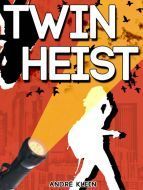 I’ve been working for a few weeks on a new short story in the suspense genre, testing the waters of the short fiction market, and experimenting with collaborative approaches to editing, i.e. sending the story to all kinds of friends and contacts and weaving their comments, feedback, suggestions, etc. into the narrative.
I’ve been working for a few weeks on a new short story in the suspense genre, testing the waters of the short fiction market, and experimenting with collaborative approaches to editing, i.e. sending the story to all kinds of friends and contacts and weaving their comments, feedback, suggestions, etc. into the narrative.
To cut a long story short, the final short story is at long last (*okay, I’ll cut it out…) finally published, and to kick things off it’s available as a free download for the next few hours! To get it now, click here or on your corresponding country code below:
Amazon US | UK | DE | FR | ES | IT
2. My CreateSpace Experiment #2Maybe you remember my first experiment in which I turned an ebook into a paperbook. I was so positively surprised by the outcome that I decided to go for it a second time. The dazzling details, incredible insights and radiant revelations (is there a special place in hell for the overuse of alliterations?) can be gleaned from a little video I made about it:
For those interested in doing something similar, here’s again a quick summary of the data:
Experiment #1: Bert Das Buch
6 by 9 inches, color, full bleed
78 pages
production & distribution: $10.52
Experiment #2: Mord Am Morgen
5.06 by 7.81 inches, black & white
80 pages
production & distribution: $3.59

 About the author:
André Klein was born in Germany, has grown up and lived in many different places including Thailand, Sweden and Israel. He has produced two music albums, performed and organized literary readings, curated an experimental television program and is the author of various short stories and non-fiction works.
About the author:
André Klein was born in Germany, has grown up and lived in many different places including Thailand, Sweden and Israel. He has produced two music albums, performed and organized literary readings, curated an experimental television program and is the author of various short stories and non-fiction works.






